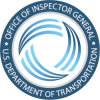What We Looked AtThe Infrastructure Investment and Jobs Act (IIJA) authorized about $660 billion in funding for new and existing U.S. Department of Transportation (DOT) programs for fiscal years 2022 through 2026—more than twice the amount in the previous 5-year authorization law. IIJA also changed existing surface transportation programs and created new programs. Federal programs face an increased risk of fraud when they experience unusually rapid growth or when new or changing laws significantly affect them. Because many IIJA-funded surface transportation programs experienced such growth and change, we initiated this audit to evaluate DOT’s fraud risk assessment processes. What We FoundDOT has an opportunity to expand its fraud risk assessment process for IIJA-funded surface transportation programs to better incorporate the Government Accountability Office's (GAO) leading practices. Following the passage of the Fraud Reduction and Data Analytics Act of 2015, DOT developed a Fraud Risk Management Plan (Plan). Although DOT anticipated fully implementing the Plan by October 2020, the Department has not yet completed two of its three planned phases. As DOT continues to implement its Plan, we found that the Department could enhance its fraud risk assessment processes to more fully incorporate leading practices identified in GAO’s Framework. Specifically, DOT could better incorporate leading practices related to planning and tailoring fraud risk assessments for all programs. DOT’s process could also better incorporate leading practices to identify and assess fraud risks and develop fraud risk profiles for its programs. By not more fully incorporating these leading practices, DOT may not be optimally positioned to comprehensively identify, properly assess, and appropriately prioritize resources to address the full spectrum of fraud risks across all of its programs, including its diverse surface transportation programs. Our RecommendationsDOT concurred with our two recommendations to improve the effectiveness of its fraud risk assessment processes. We consider these recommendations resolved but open pending completion of planned actions.
Open Recommendations
| Recommendation Number | Significant Recommendation | Recommended Questioned Costs | Recommended Funds for Better Use | Additional Details | |
|---|---|---|---|---|---|
| 2 | Yes | $0 | $0 | ||
| Provide guidance to OAs on how to identify and assess fraud risks in their programs, including guidance on specific tools, methods, and sources for gathering information about fraud risks. This guidance should also address the leading practices for identifying and assessing the likelihood and impact of inherent fraud risks, determining fraud risk tolerance, examining the suitability of existing controls, prioritizing residual fraud risks, and documenting the program's fraud risk profile to inform managers' decisions on their responses to assessed risks. | |||||


